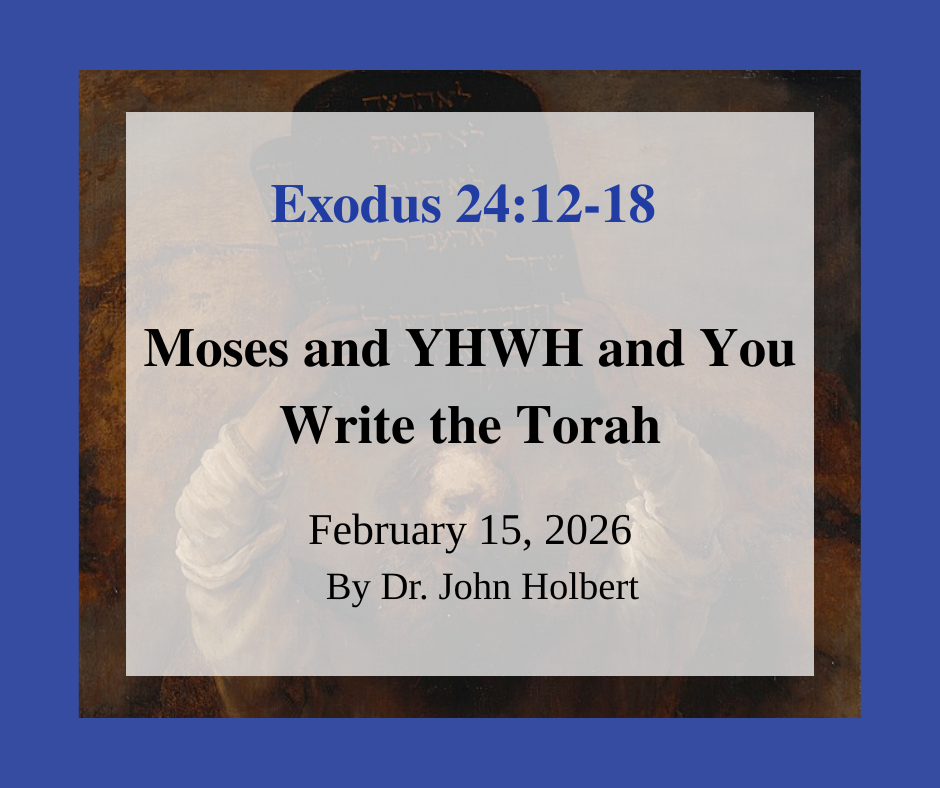Moses and YHWH and You Write the Torah - Reflections on Ex 24:12-18, Transfiguration Sunday, Year A
by John C. Holbert on Wednesday, November 26, 2025

I have often thought of Transfiguration Sunday as a sort of Halloween for Christians. On the secular holiday of Halloween, though it is historically connected to All Hallows Eve, a decidedly Christian event, many young folk, and a few not so young, dress up in outlandish costumes, rush around formerly quiet and unassuming neighborhoods, and demand candy, lest a house get egged, papered, or experience some other nuisance trick. On Transfiguration Sunday, the church celebrates another dress-up event, where Moses and his cohorts head up the sacred mountain to picnic with YHWH, and YHWH appears to them dressed as “a devouring fire,” or a “consuming fire,” the adjective usually associated with food and eating. Though YHWH does not demand candy from those who have ventured up the mountain for the divine meeting, nor does Moses ask a Snickers Bar from YHWH, yet YHWH gives them instead “the tablets of stone, the Torah and the commandment that I have written for their instruction” (Ex.24:12). All this comes from “the glory of YHWH” whose appearance is that of a consuming fire.
However, what is often forgotten about this famous scene, the basis for Judaism of the legend of the giving of the commandments of YHWH to Moses from Sinai, commandments ultimately said to be 613 when counted up by the rabbis, is that YHWH is not the only one to write these commandments. Earlier in the chapter, the portrait of the gift of the Torah is significantly different. YHWH there says to Moses, “Come up to YHWH, you and Aaron, Nadab, Abihu, and seventy elders of Israel, and worship at some distance. Moses alone will come close to YHWH, but those others shall not come close, while the people will not come up with him” (Ex.24:1-2). Now there is a lacuna in the tale, because vs.3 says that, “Moses came and narrated to the people all YHWH’s words, especially the words of justice; and all the people answered with one voice, ‘All the words spoken by YHWH we will do’” (Ex.24:3). Thus, we must conclude that while Moses has stood alone before his God, that God has spoken words to him that include what I have translated “words of justice,” a word translated by NRSV as “ordinances.” That may be the more traditional reading of the word, but it is based on the famous Hebrew for “justice,” that familiar word from the prophets that implies right dealings in a court, fair legal practice for all.
Then comes the surprising phrase: “Then Moses wrote down all YHWH’s words” (Ex.24:4). That means that Moses is as much the composer of the Torah of YHWH as YHWH is! Moses is remembered in the tradition as a writer; at Ex.34:28, after the astonishing confrontation with YHWH on the mountain, where Moses argues with YHWH about the survival of the calf-building people (Ex.32), we are told that “he (Moses) wrote on the tablets (that is, new tablets cut by YHWH to replace the originals smashed by an enraged Moses at the base of the mountain [EX.32:19]) the words of the covenant, the ten words” (i.e. the Ten Commandments). YHWH also asks Moses to write after the attack of Amalek on Israel at Ex.17:14. During the wilderness wandering, Moses writes the itinerary of the journey for the people (Num.33:2), and of course in Deut.31, he is said to have written what tradition calls the “Song of Moses” (see 31:9, 22 and Deut.33). This legend of a Moses who writes led the rabbis early on to imagine that Moses himself wrote the Pentateuch, however difficult it was for some to imagine just how he wrote about his own death in Deut.34!
What I like about this collaboration between Moses and YHWH in the composition of the Torah is precisely what the rabbis thought about Moses, that he was somehow unique among the people. Only he could see YHWH face to face on the mountain; only he could argue with YHWH about the future of the people of Israel—and win! Only he could then write down the exact words of YHWH and give them to the people to act upon.
Are you and I not similar to the prophet Moses? Does not YHWH ask us to compose the Torah anew for our age, to give it to our people in order that they might perform that Torah in their lives? We are not asked by God merely to repeat the ancient words in the same way they were first offered to Moses and his people on the sacred mountain. The words of YHWH assume different nuances and meanings as languages and cultures change over time, and we preachers and teachers are charged to translate for our people the power and authority of those words in contemporary settings. Simply placing the Ten Commandments in public places is hardly a guarantee of any new behaviors from people who live lives far removed from that of ancient Israel. Those commandments retain power, but only when they are freshly explained and recomposed for our day. It is our continual task to take up that work first given to the great Moses. We along with YHWH continue to write the Torah, and no greater work could be given to us to do.
